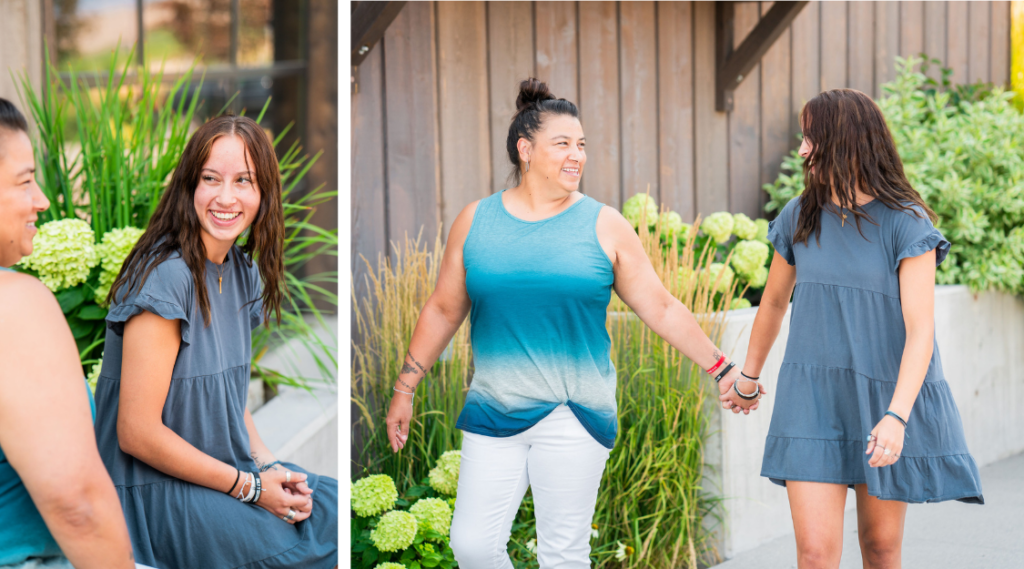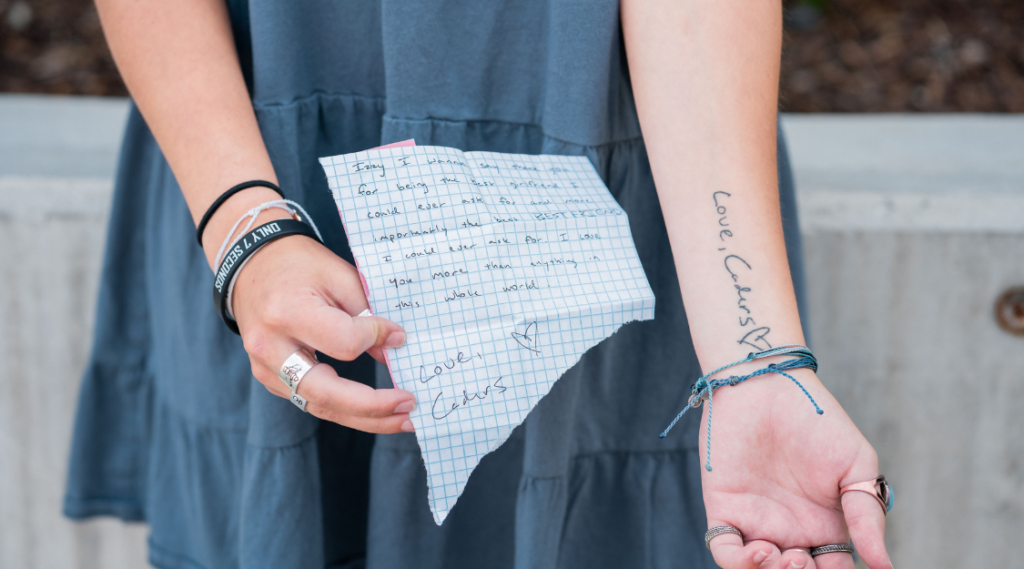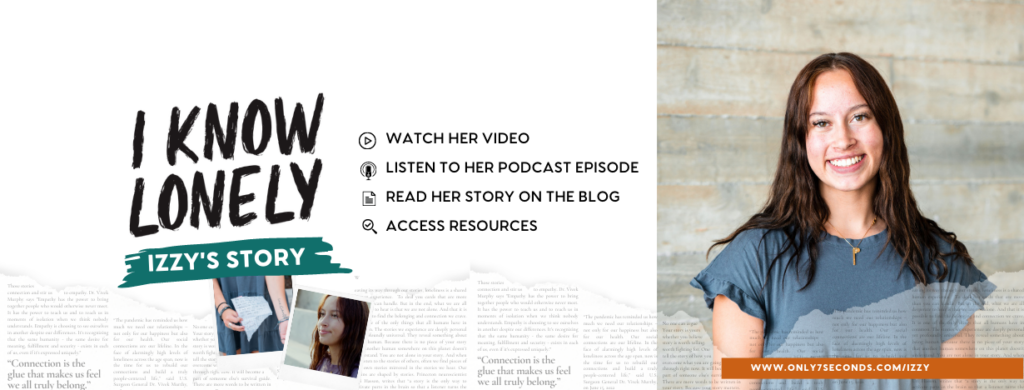Izzy Boring was born in a small town north of Spokane, Washington. Izzy began playing basketball when she was four years old – in part because she was the only girl in a family of four brothers. Life took a turn for Izzy, when as an eight year old, Izzy’s father was sentenced to six years in prison for theft.
“We were all on the couch and they [the police] came and they took my dad away. So that was really hard as an eight year old, seeing all these police show up to your house, all the red and blue lights, and then watching them escort your dad out and having no idea why.”
After her dad was sentenced, Izzy’s family moved into a single wide trailer in Spokane. “I was pinned as being a daughter whose dad went to prison. That’s how I saw myself because of what other people told me,” Izzy says. To someone in a similar situation, Izzy says to remember that “the actions of other people doesn’t determine who you are, and it was never your fault.”
When her dad went to prison, Izzy started to focus on basketball more. “My dad was always happy when I did good or when I performed well in basketball. So I thought that everyone was happy when Izzy did good in basketball.”
Her sophomore year of high school, Izzy moved to a different school. She remembers feeling out of place. “I think when you’re a 16-year-old girl, you don’t know who you are yet.”
A couple games into her sophomore year, she sprained her MCL and couldn’t play basketball for the season. “I think that is when I first started experiencing anxiety and depression and loneliness was when the one thing like I held onto [basketball], got taken away from me.”
During this time of depression, Izzy wrote a letter to her mom explaining how she was feeling. “I was telling her, I just don’t want to be here anymore… I don’t feel worthy. I just feel like there’s no reason to be here anymore…”

Izzy’s mom read the letter and reinforced the idea that she loved Izzy no matter how she was feeling. Izzy began seeing a counselor. “She [Izzy’s mom] redirected me to who God says I am.” During this time, Izzy says she learned that “God uses our message for other people… It gave me a purpose, through my pain that I didn’t have to go through it just to go through it… but that God had something so much bigger on the other end of it.”
During her junior year, the COVID-19 pandemic slowed the world down. At the same time, she started talking to Cade, a boy she had met at the state basketball tournament.
“Quarantine kind of worked out in our favor… I guess, because we would FaceTime each other and we didn’t have school and so we could just spend however long we wanted talking and texting. And we FaceTimed for about eight months before we actually met each other.”
Izzy and Cade met face-to-face at the beginning of her senior year. “When we met, it was like, I’ve known him my whole life and so it was never awkward. And from then on out, we just like we’re best friends. We started dating really shortly after that.”
Due to the pandemic, both Izzy and Cade were doing school online so they would alternate spending a week with each other’s families. “We’d have holidays together. Like every single waking moment we spent with each other… It just felt like a fairytale for me.”
“I think growing up… [I] experienced love that was super broken and super fractured.” Izzy says being with Cade was “really refreshing. I was like, ‘wow, this is how I deserve to be loved.’ [Cade] loved me for who I was and I didn’t have to do anything to make him love me more,” she remembers.
Cade took his own life in March.
The night that she found out Cade had passed away, Izzy remembers praying that God would take her with him. “I cannot spend a day, I can’t spend a second, I can’t spend another hour like on this earth if he’s not here. There’s just like no point.”

“I prayed that every night for a week. Thankfully God didn’t answer that prayer.”
Izzy says Cade’s passing changed the trajectory of her life completely. “It truly tore me apart and I had to start all over again. And I didn’t even want to start all over again… I had so many plans with Cade and we were gonna go to the same college. We were gonna play basketball, we were gonna get married young, we were gonna live together, and still go to college after we got married. We had plans and everything. And just to have those plans destroyed in a matter of seconds and then have someone who you thought you were going to marry, not there anymore and a matter of seconds was really hard.”
“One thing that I’ve kind of figured out is that grief is not just five stages. I think we’re fed that all the time. Like when you lose someone, you’re gonna go through these five stages and they’re gonna look exactly like this…”
“There’s no formula to grief. Everyone is gonna experience those feelings differently. People move forward at different times, but that loss is never gonna go away. What I’ve learned too is the loss isn’t who I am, but it’s still gonna be a part of me forever and it’s gonna shape me.”
To someone experiencing loss, Izzy says the grief is just something you have to feel. “I tried to suppress it and I didn’t want to feel those things because they hurt so much and I didn’t know anyone else who was going through it. The more I suppressed it, the worse it got.”
Izzy knows now that when people in her life hurt her, it’s not because of who she is.
“What Cade did isn’t a reflection of how he felt about me. It wasn’t a reflection of who I was in his life. Because I loved him deeply; he loved me deeply and he didn’t make that decision because of who I am. My dad didn’t decide to steal or not be a part of my life now because of who I am. There’s nothing I did or I could have done differently to keep them here.”

Since graduating high school, Izzy has been studying English at Corbin University on a basketball scholarship. Being a college athlete brings its own mental health challenges.
“The things that we get told as athletes carry into our lives outside of it. When we’re told we’re not strong enough, on the court, then when we’re in alone in our room, we’re like, ‘okay, I’m not strong enough.’ It’s the things we get constantly told as athletes, we believe that are about ourselves, day in and day out.”
“I think it’s so easy to let the people around you or the people you care about define who you are. And I think in school, or just like in athletics in general, if you’re the best, you’re praised or if you get a good grade, you’re praised… And I think as society we’ve fallen away from just praising people for getting out of bed. Even just breathing or going about your day or taking a step forward like that is such a big accomplishment in and of itself. Or just stepping out and being bold in who you are and in your own skin like that is such a big victory in my eyes.”
One way Izzy normalizes small victories is through her social media accounts. “The world needs to see what real people look like…. I just want to look real and show people what real life looks like. I’m not happy all the time, like I cry a lot. And I think that’s an okay thing. And I don’t feel like getting out of bed a lot. That’s an okay thing. That’s a normal feeling that we have….On social media, I’ll post pictures of me crying or just having a really bad day.”
Izzy says it’s important to not let the things we see on social media define us. “I think we’re fed these aesthetics all the time. Like we have to fit into this certain persona or we have to look a certain way in order to be accepted by people. And you have to fit in this box; if you go outside of the box, people aren’t going to like that.”
Izzy views sharing her real life on social media as a way to help people feel less alone. “I felt like God called me up in that sort of thing. Like ‘You’ve always wished for someone to look up to. I’m gonna let you be this person to other people, even though it’s hard. Whatever I’ve gone through, if there’s one person that’s impacted or feels less alone because of what I share, then it’s so worth it.”
“Your walk with grief doesn’t have to look like anyone else’s, and it doesn’t have to feel perfect. It doesn’t have to feel like you’re moving forward. I think we do live in a society where… you have to keep going forward, you have to keep moving. But I think it’s okay to stand still for a little bit and I think it’s okay to pause… Recognize the things you’re feeling. .. It’s imperative to feel those things before you can move forward.”

Watch: Izzy’s Story on short video | Listen: Izzy’s Story on the podcast | Access: Resources

View comments
+ Leave a comment